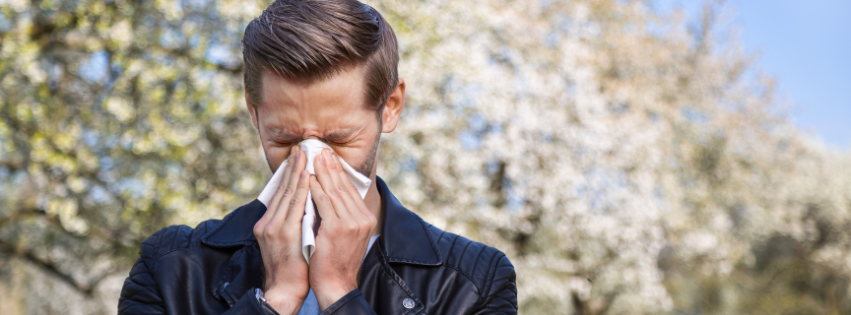
8 Natural Ways to Fight Seasonal Allergies Without Medication
BALA BITES: WAYS TO BEAT ALLERGY SEASON
With spring comes earlier sunrises, more time outside...and seasonal allergies.
Roughly 100 million Americans suffer from allergies or asthma. That’s nearly 1 in 3 of us. And the numbers are rising.
Sure, you can reach for the meds. But most over-the-counter antihistamines come with side effects — drowsiness, dry mouth, foggy brain.
There’s another way. A better way.
Here are some natural strategies and time-tested remedies to help you get ahead of allergy season — and stay there.

1. LOCAL HONEY
This might be the tastiest medicine on Earth.
Raw, unfiltered local honey can help train your immune system to chill out when exposed to pollen.
Bees collect pollen from nearby plants. That pollen ends up in the honey. Small daily exposure = less dramatic immune response over time.
But be choosy. Most store honey isn’t honey. It’s a pasteurized, filtered syrup with all the good stuff removed.
Look for local, raw, unfiltered honey — ideally with pollen and propolis still intact. Here's why having pollen and propolis matters.
2. RINSE & REPEAT
Your nose is your first line of defense.
A daily sinus rinse flushes allergens before they have a chance to set up shop.
Neti pots work, but try the NeilMed Sinus Rinse. Under $15 and it just works.
Pro tip: After rinsing, add a dab of eucalyptus oil under your nose or a swipe of non-toxic Vaseline inside each nostril.
3. HEAL YOUR GUT, CALM YOUR ALLERGIES
70% of your immune system lives in your gut. If your gut’s inflamed or imbalanced, your immune system goes haywire.
Which means more histamine. More reactivity. More misery.
To calm the chaos:
- Cut out refined sugar, seed oils, and processed grains (just 2-4 weeks can help)
- Load up on soluble fiber from veggies and fruits
- Add high-quality collagen to support your gut lining
Caution: Bone broth and fermented foods (like kefir or sauerkraut) are great for gut health — but high in histamine. If you're in a flare, they may do more harm than good.
4. EAT LIKE IT MATTERS (BECAUSE IT DOES)
Nutrition is your frontline defense.
To regulate inflammation and histamine, prioritize:
- Vitamin C: Bell peppers, kiwi, citrus, strawberries, broccoli
- Omega-3s: Wild salmon, sardines, flaxseed, chia, walnuts
- Quercetin: Onions, peeled apples, kale, blueberries, dill
- ALA-rich: Flax oil, hemp seeds, leafy greens
- Anti-inflammatory: Turmeric, ginger, EVOO, wild blueberries
Avoid the stuff that fans the flames: added sugar, seed oils, ultra-processed snacks, and dairy (if it triggers mucus for you).

5. POWER NAP, LEGS UP
A weird one, but it works.
Lying down with legs elevated for 10 minutes helps lymphatic drainage, which supports digestion, detox...and yes, allergy relief.
It’s Navy SEAL-approved. Check out our post on lymphatic drainage.
6. NATURAL ANTIHISTAMINES
Instead of just masking symptoms with OTC meds, go deeper. Here are our favorite natural options worth exploring:
- Quercetin: Stabilizes mast cells, lowers histamine release
- Vitamin C: Potent anti-inflammatory and antioxidant
- Stinging Nettle: Herbal option with mild benefit
- Bromelain: A Pineapple enzyme that may reduce nasal swelling
7. REGION MATTERS (A LOT)
Not all allergy seasons are created equal. Where you live can dramatically shape your symptoms.
Cities like Wichita, Scranton and Oklahoma City top the AAFA list for worst seasonal allergies, thanks to high pollen counts and long bloom seasons.
Urban landscaping, temperature swings and wind patterns all play a role.
Want to see how your city ranks? Check the AAFA Allergy Capitals map.
If you’re in a red zone, these natural tools might just become your spring survival kit.
8. GET INTO THE DETAILS
Know what’s blooming near you — and how that may cross-react with what’s on your plate.
Here’s a quick guide to help you steer clear:
- Birch pollen: Avoid apples, pears, peaches, cherries, carrots, celery, almonds, hazelnuts
- Grass pollen: Limit tomatoes, melons, oranges, peaches
- Ragweed pollen: Avoid bananas, cantaloupe, watermelon, zucchini, and chamomile tea
- Mugwort pollen: Avoid celery, carrots, fennel, coriander, and cumin
BOTTOM LINE ON HOLISTIC ALLERGY RELIEF
If you want to stop seasonal allergies at the root, improving your gut health and reducing inflammatory foods is essential.
With the right tools and a little intention, you can stay ahead of the histamine storm. Without relying on OTC allergy medication.
Want one small win for your week? Find a local source of raw, unfiltered honey and take a spoonful daily.
Because small steps, done consistently, often beat big meds.
KEY TAKEAWAYS
- Raw, unfiltered local honey can help desensitize your body to local pollen — but most store-bought honey doesn’t cut it.
- Your gut health plays a major role in allergy symptoms. Reducing inflammation and supporting your microbiome can make a big difference.
- Nutrient-dense, anti-inflammatory foods (like those rich in vitamin C and omega-3s) and histamine-reduced diets are a powerful way to support your body’s natural defenses
- Not all allergy seasons are the same — your local pollen types and climate can affect what foods and symptoms to watch for so consider region-specific pollen triggers
- Learning how to treat seasonal allergies naturally using proven methods like local honey, gut health support and anti-inflammatory foods helps reduce the amount of OTC medication you need to take.
FURTHER READING
Confused by the terms shaping nutrition, fitness, and longevity today? Check out our modern health glossary to clear the confusion.
Know why Pecorino Romano is a longevity cheese? Read why science considers it to be the healthiest cheese on the planet
Trying to solve digestive issues? Start with what's going on with your gut microbiome.